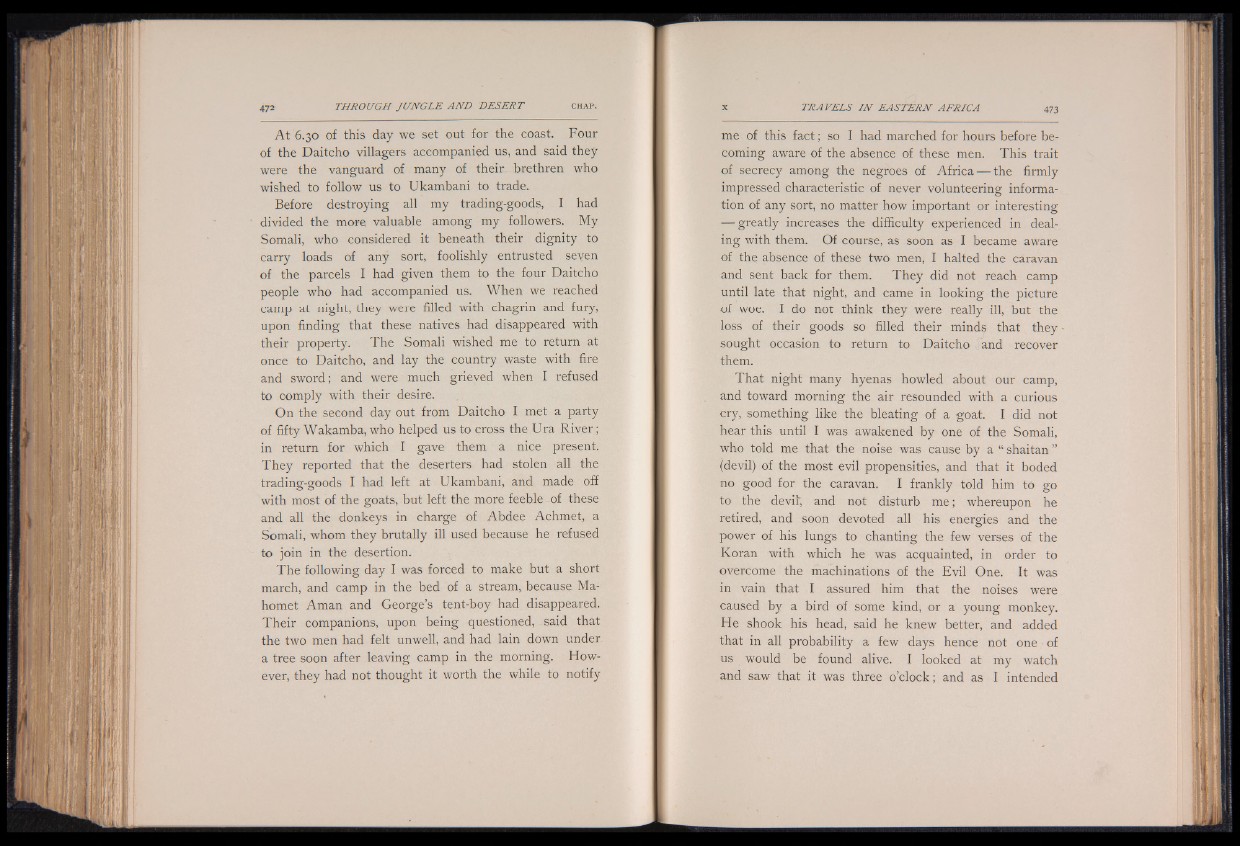
A t 6.30 of this day we set out for the coast. Four
of the Daitcho villagers accompanied us, and said they
were the vanguard of many of their brethren who
wished to follow us to Ukambani to trade.
Before destroying all my trading-goods, I had
divided the mare valuable among my followers. My
Somali, who considered it beneath their dignity to
carry loads of any sort, foolishly entrusted seven
of the parcels I had given them to the four Daitcho
people who had accompanied us. When we reached
camp at night, they were filled with chagrin and fury,
upon finding that these natives had disappeared with
their property. The Somali wished me to return at
once to Daitcho, and lay the country waste with fire
and sword; and were much grieved when I refused
to comply with their desire.
On the second day out from Daitcho I met a party
of fifty Wakamba, who helped us to cross the Ura River;
in return for which I gave them a nice present.
They reported that the deserters had stolen all the
trading-goods I had left at Ukambani, and made off
with most of the goats, but left the more feeble of these
and all the donkeys in charge of Abdee Achmet, a
Somali, whom they brutally ill used because he refused
to join in the desertion.
The following day I was forced to make but a short
march, and camp in the bed of a stream, because Mahomet
Aman and George’s tent-boy had disappeared.
Their companions, upon being questioned, said that
the two men had felt unwell, and had lain down under
a tree soon after leaving camp in the morning. However,
they had not thought it worth the while to notify
me of this fact; so I had marched for hours before becoming
aware of the absence of these men. This trait
of secrecy among the negroes of Africa — the firmly
impressed characteristic of never volunteering information
of any sort, no matter how important or interesting
— greatly increases the difficulty experienced in dealing
with them. Of course, as soon as I became aware
of the absence of these two men, I halted the caravan
and sent back for them. They did not reach camp
until late that night, and came in looking the picture
of woe. I do not think they were really ill, but the
loss of their goods so filled their minds that they
sought occasion to return to Daitcho and recover
them.
That night many hyenas howled about our camp,
and toward morning the air resounded with a curious
cry, something like the bleating of a goat. I did not
hear this until I was awakened by one of the Somali,
who told me that the noise was cause by a “ shaitan ”
(devil) of the most evil propensities, and that it boded
no good for the caravan. I frankly told him to go
to the devil; and not disturb me; whereupon he
retired, and soon devoted all his energies and the
power of his lungs to chanting the few verses of the
Koran with which he was acquainted, in order to
overcome the machinations of the Evil One. It was
in vain that I assured him that the noises were
caused by a bird of some kind, or a young monkey.
He shook his head, said he knew better, and added
that in all probability a few days hence not one of
us would be found alive. I looked at my watch
and saw that it was three o’clock; and as I intended